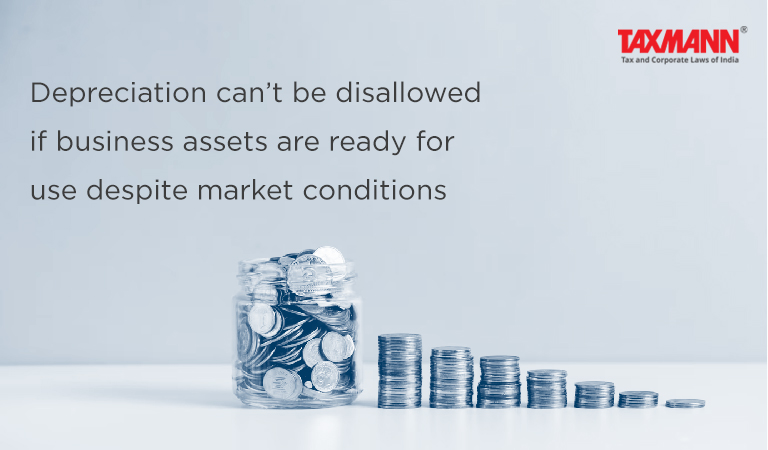Depreciation can’t be disallowed if business assets are ready for use despite market conditions
- Blog|News|Income Tax|
- 2 Min Read
- By Taxmann
- |
- Last Updated on 31 March, 2023

Case Details: Sambhav Energy Ltd. v. ACIT - [2023] 148 taxmann.com 210 (Jodhpur-Trib.)
Judiciary and Counsel Details
-
- B.R. Baskaran, Accountant Member & Sandeep Gosain, Judicial Member
- Amit Kothari, (CA) for the Appellant.
- Smt. Alka Rajvanshi Jain, CIT-DR for the Respondent.
Facts of the Case
Assessee-company engaged in the business of generation and sale of electricity. While filing the return of income, assessee claimed depreciation on the business assets. During the assessment proceedings, the Assessing Officer (AO) noticed that the assessee had not carried out any business activity in the relevant assessment year.
In response, assessee submitted that it had stopped business activity since the production became unviable as the sale price was less than its manufacturing cost. Considering that the assessee had no intention to carry on the business activity, AO disallowed the depreciation claim and made additions to the income of assessee.
On appeal, the CIT(A) confirmed the additions made by the AO, and the matter reached Jodhpur Tribunal.
ITAT Held
The Tribunal held that the assessee had not completely stopped the business as presumed by the tax authorities. Though the AO stated that the assessee did not start business activities in the subsequent years also, it was not shown that the electricity generation business was completely abandoned.
In the instant case, the assessee kept the assets ready for use, and it was expecting only a favourable market situation. Assessee may revive its business when the market position turns favourable. Further, the business establishment was properly maintained, and it was generating other types of income. Therefore, the additions made by the AO were deleted.
List of Cases Reviewed
-
- CIT v. Swarup Vegetable Products India Ltd. [2005] 145 Taxman 253/277 ITR 60 (All.)
- National Thermal Power Corpn. Ltd. v. CIT [2012] 28 taxmann.com 89/211 Taxman 505/[2013] 357 ITR 253 (Delhi) (para 14) followed.
List of Cases Referred to
-
- CIT v. Geo Tech Construction Corpn. [2000] 112 Taxman 373/244 ITR 452 (Ker.) (para 10)
- National Thermal Power Corpn. Ltd. v. CIT [2012] 28 taxmann.com 89/211 Taxman 505/[2013] 357 ITR 253 (Delhi) (para 10)
- CIT v. Swarup Vegetable Products India Ltd. [2005] 145 Taxman 253/277 ITR 60 (All.) (para 10)
- CIT v. Refrigeration & Allied Industries Ltd. [2000] 113 Taxman 103/[2001] 247 ITR 12 (Delhi) (para 10)
- CIT v. Oswal Woollen Mills Ltd. [2007] 289 ITR 261 (Punj. & Har.) (para 10)
- Dy. CIT v. Ashik Woollen Mills [2017] 80 taxmann.com 357/164 ITD 331 (Mum.) (para 11).
Disclaimer: The content/information published on the website is only for general information of the user and shall not be construed as legal advice. While the Taxmann has exercised reasonable efforts to ensure the veracity of information/content published, Taxmann shall be under no liability in any manner whatsoever for incorrect information, if any.

Taxmann Publications has a dedicated in-house Research & Editorial Team. This team consists of a team of Chartered Accountants, Company Secretaries, and Lawyers. This team works under the guidance and supervision of editor-in-chief Mr Rakesh Bhargava.
The Research and Editorial Team is responsible for developing reliable and accurate content for the readers. The team follows the six-sigma approach to achieve the benchmark of zero error in its publications and research platforms. The team ensures that the following publication guidelines are thoroughly followed while developing the content:
- The statutory material is obtained only from the authorized and reliable sources
- All the latest developments in the judicial and legislative fields are covered
- Prepare the analytical write-ups on current, controversial, and important issues to help the readers to understand the concept and its implications
- Every content published by Taxmann is complete, accurate and lucid
- All evidence-based statements are supported with proper reference to Section, Circular No., Notification No. or citations
- The golden rules of grammar, style and consistency are thoroughly followed
- Font and size that’s easy to read and remain consistent across all imprint and digital publications are applied



 CA | CS | CMA
CA | CS | CMA
